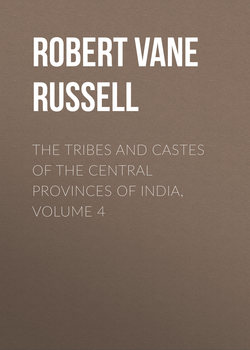Читать книгу The Tribes and Castes of the Central Provinces of India, Volume 4 - Robert Vane Russell - Страница 28
Part II
Articles on Castes and Tribes
Kumhār—Yemkala
Vol. IV
Kunbi
15. Mourning
ОглавлениеThe period of mourning for adults of the family is ten days, and for children three, while in the case of distant relatives it is sufficient to take a bath as a mark of respect for them. The male mourners shave their heads, the walls of the house are whitewashed and the floor spread with cowdung. The chief mourner avoids social intercourse and abstains from ordinary work and from all kinds of amusements. He debars himself from such luxuries as betel-leaf and from visiting his wife. Oblations are offered to the dead on the third day of the light fortnight of Baisākh (June) and on the last day of Bhādrapad (September). The Kunbi is a firm believer in the action of ghosts and spirits, and never omits the attentions due to his ancestors. On the appointed day he diligently calls on the crows, who represent the spirits of ancestors, to come and eat the food which he places ready for them; and if no crow turns up, he is disturbed at having incurred the displeasure of the dead. He changes the food and goes on calling until a crow comes, and then concludes that their previous failure to appear was due to the fact that his ancestors were not pleased with the kind of food he first offered. In future years, therefore, he changes it, and puts out that which was eaten, until a similar contretemps of the non-appearance of crows again occurs. The belief that the spirits of the dead pass into crows is no doubt connected with that of the crow’s longevity. Many Hindus think that a crow lives a thousand years, and others that it never dies of disease, but only when killed by violence. Tennyson’s ‘many-wintered crow’ may indicate some similar idea in Europe. Similarly if the Gonds find a crow’s nest they give the nestlings to young children to eat, and think that this will make them long-lived. If a crow perches in the house when a woman’s husband or other relative is away, she says, ‘Fly away, crow; fly away and I will feed you’; and if the crow then flies away she thinks that the absent one will return. Here the idea is no doubt that if he had been killed his spirit might have come home in the shape of the crow perching on the house. If a married woman sees two crows breeding it is considered a very bad omen, the effect being that her husband will soon die. It is probably supposed that his spirit will pass into the young crow which is born as a result of the meeting which she has seen.
Mr. A. K. Smith states that the omen applies to men also, and relates a story of a young advocate who saw two crows thus engaged on alighting from the train at some station. In order to avert the consequences he ran to the telegraph office and sent messages to all his relatives and friends announcing his own death, the idea being that this fictitious death would fulfil the omen, and the real death would thus become unnecessary. In this case the belief would be that the man’s own spirit would pass into the young crow.
